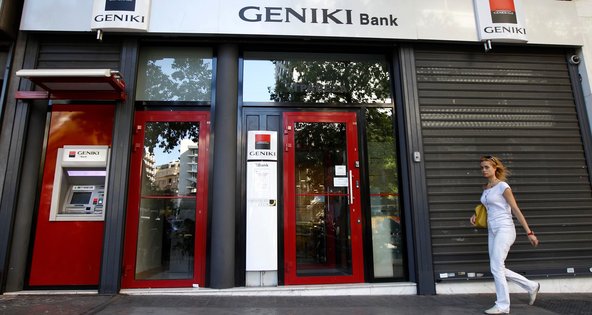 John Kolesidis/ReutersA branch of Geniki in Athens. Greece’s battered banks are consolidating in an attempt to cope with the country’s debt crisis.
John Kolesidis/ReutersA branch of Geniki in Athens. Greece’s battered banks are consolidating in an attempt to cope with the country’s debt crisis.
PARIS — France’s biggest banks are preparing to pull out of Greece in the coming weeks, the latest large international business to abandon the country as it grapples with a debilitating recession and nagging questions about its future in the euro zone.
Société Générale said Wednesday that it was in advanced discussions to sell its 99.1 percent stake in Geniki Bank, one of Greece’s biggest financial institutions, to Piraeus Bank of Greece. On Tuesday, Crédit Agricole, another large French lender, said it expected to sign a deal to sell its troubled Greek arm, Emporiki Bank, to another Greek bank in a matter of weeks.
The French banks had embarked on a strategy of expanding in Greece and other Southern European countries when times were good, moving to take advantage of buoyant housing markets and rapid economic growth. When a deterioration in Greece’s finances helped ignite the European debt crisis three years ago, Société Générale and Crédit Agricole wound up being among the most exposed of any European banks to Greece.
Their earnings were hit last year when a swath of Greek government bonds they had invested in turned toxic as the crisis deepened. At the same time, losses mounted at their Greek operations as the country’s economy plunged, triggering a surge of defaults on loans to consumers and businesses. Fears that Greece could exit the euro had also raised uncertainty for the banks, leading them to follow in the footsteps of other large international companies like Carrefour, the big French supermarket chain that two months ago sold off all of its Greek operations.
Prime Minister Antonis Samaras of Greece has been on a charm offensive in European capitals recently to reinforce the message that Greece wants to stay in the euro zone, despite renewed calls from some German politicians for it to leave and a resurgence in bets by investors that a Greek exit from the currency union may at some point be inevitable.
To show that his government means business, Mr. Samaras is scrambling to get politicians in his coalition government to agree quickly to 11.5 billion euros, or $14.4 billion, worth of new austerity measures for 2013 and 2014 in order to secure a loan installment of 31.5 billion euros, which is needed to keep Greece’s economy afloat.
Greece’s so-called troika of lenders — the International Monetary Fund, the European Central Bank and the European Commission — are set to issue a crucial assessment in the coming weeks of how far off track the country is in sticking to its promises to reduce a mountain of debt and a high deficit.
Even if the report were positive, Greece’s real economy is still struggling: The government estimates growth will contract by a staggering 7 percent this year, worse than the 4.8 percent contraction forecast earlier this year by the I.M.F.
With such prospects, Société Générale and Crédit Agricole determined that it would be better to cut their losses.
Société Générale bought Geniki Bank in 2004. It had been bleeding money for the last several years, with losses of 796 million euros in 2011 and 411 million euros in 2010. Emporiki Bank has been a drag on Crédit Agricole’s earnings almost since the French bank acquired it in 2006. In the first nine months of 2011, Emporiki posted a loss of 954 million euros, and Crédit Agricole has pumped about 2 billion euros into the bank in the last two years to increase its capital.
The Greek banking sector is grappling with large loan losses as thousands of businesses go belly up each month and consumers, racked by salary cuts and tax increases required under the terms of Greece’s international bailout, are left unable to repay their debts.
Greek banks also took a huge hit after they agreed, with banks outside the country, to take a 50 percent loss on their vast holdings of Greek government debt. Recently, the E.C.B. has refused to lend directly to Greek banks because the quality of the collateral they have to offer has become extremely poor. The banks must instead borrow money from the Greek central bank, at a higher interest rate than what the E.C.B. would charge, adding to their burden.
Article source: http://dealbook.nytimes.com/2012/08/29/french-banks-prepare-to-pull-out-of-greece/?partner=rss&emc=rss